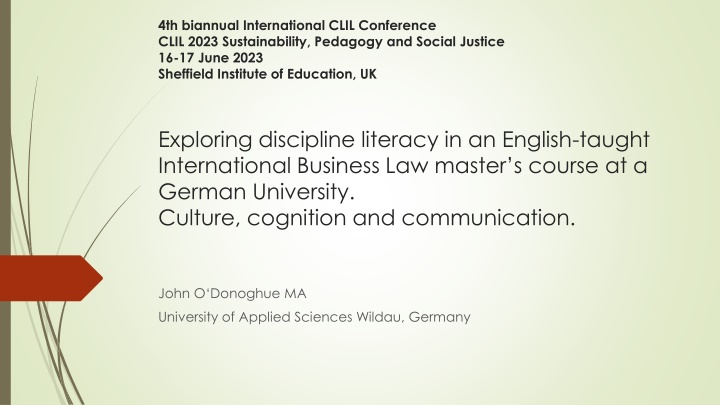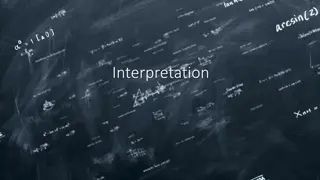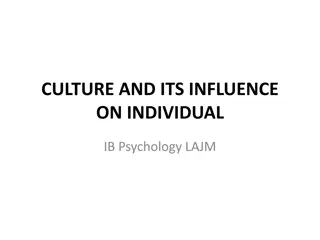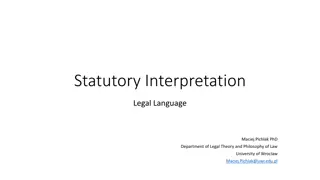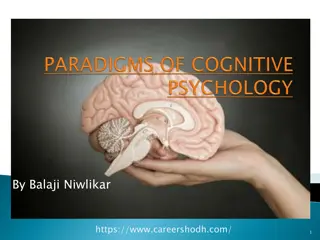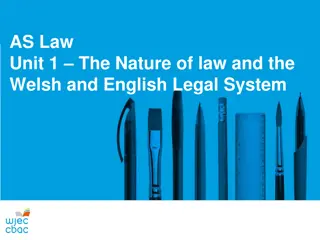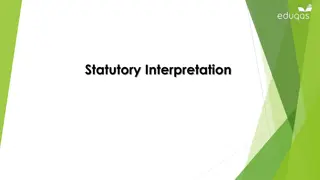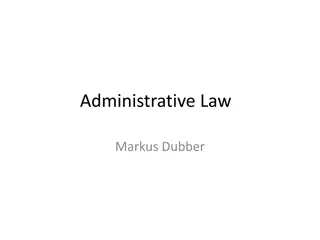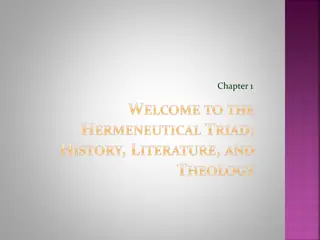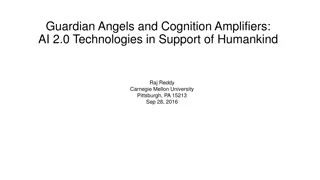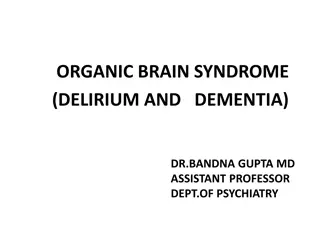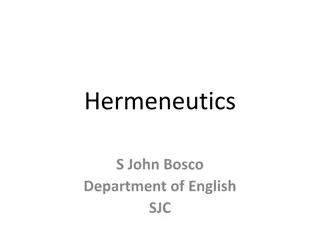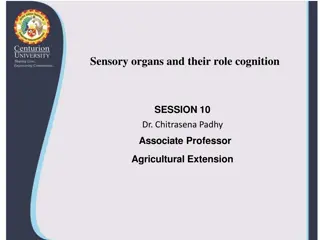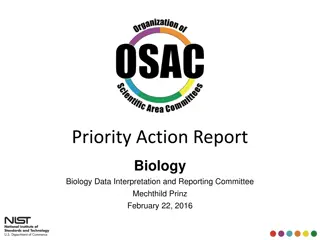English Law Study: Culture, Cognition, History, and Interpretation
This presentation delves into the nuances of studying English Law within the German education system, focusing on the cultural and historical aspects of the English Common Law Legal Tradition versus the Civil Law Continental Tradition. The talk explores the cognitive processes involved in interpreting statutes in both English and Continental legal frameworks, highlighting the importance of clarity, precision, and effective communication in legal contexts.
Download Presentation

Please find below an Image/Link to download the presentation.
The content on the website is provided AS IS for your information and personal use only. It may not be sold, licensed, or shared on other websites without obtaining consent from the author.If you encounter any issues during the download, it is possible that the publisher has removed the file from their server.
You are allowed to download the files provided on this website for personal or commercial use, subject to the condition that they are used lawfully. All files are the property of their respective owners.
The content on the website is provided AS IS for your information and personal use only. It may not be sold, licensed, or shared on other websites without obtaining consent from the author.
E N D
Presentation Transcript
4th biannual International CLIL Conference CLIL 2023 Sustainability, Pedagogy and Social Justice 16-17 June 2023 Sheffield Institute of Education, UK Exploring discipline literacy in an English-taught International Business Law master s course at a German University. Culture, cognition and communication. John O Donoghue MA University of Applied Sciences Wildau, Germany
Background This talk is based on attending lectures given by Professor J rg Peter on English Private Law and teaching the module English Law in the 2022 summer semester to five master s students in the degree programme Business and Law at the University of Applied Sciences Wildau in Bradenburg, just outside of Berlin. The five students participated in a one-hour qualitative interview (focus group) in January 2023 discussing their experiences of studying in the bilingual programme (English/German).
Culture and history English Common Law Legal Tradition: Case law by defintion looks back in history to cases that are governed by the principle of binding precedent. Key is the Ratio decidendi of a judgment defined as the principles of law formulated by the judge These are just cases, where are the principles defined? German Master s student in week two. Civil Law Continental Tradition: Those countries that have rules of law created by statute by definition focus not on historical precedent but careful interpretation of written laws.
Cognition: Interpreting Statutes: English and Continental: Literalism V Purposive English literalist interpretation: Legislation defines the area of application and limits Judicial precedent Interpretation Act 1978 Oxford English Dictionary Law Commission Reports Hansard official Parliamentary proceeding
Interpreting Statutes: English and Continental Continental interpretation Purposive approach: The purposive approach to interpreting legislation looks beyond the words of the legislation at the purpose behind it, and the legislation is seen as a skeleton of the law for the judges to flesh out in time. The purposive approach has its roots in legal systems which are based on civil codes and is sometimes referred to as the teleological approach (to what end/result is the law intended?). It is used in EU law (lexisnexis).
Clarity and Precision: Culture and Communication McKENNA AND OTHERS v BRITISH ALUMINIUM LIMITED [2002] 16th January 2002 MR JUSTICE NEUBERGER: In my judgment, it is logically inescapable that the reasoning of the House of Lords in Cambridge Water [1994] 2 AC 264, and in particular in the passages in the speech of Lord Goff which I have quoted, leads to the conclusion that, in order for a claim to be brought in Rylands v Fletcher, the claimant must have an interest in the land which would be sufficient to justify him bringing a claim in nuisance.
MR JUSTICE NEUBERGER: In this connection, it seems to me that the words of Lord Goff, representing, as they do, the unanimous view of the House of Lords, indicate that when considering a claim in Rylands v Fletcher one should treat it effectively as an extension or branch of the law of nuisance. Not in the sense that it is an extension in a number of possible directions, including an extension to the identity and nature of persons who can sue, but an extension in the sense that an isolated incident, which might not have been regarded in the 19th century (and might not even be regarded in the 20th or 21st century) as being a nuisance, can, if it involves an escape of the relevant nature, give rise to a claim in what amounts to nuisance
CONCLUSION German students reading English law have to become familiar with the importance of case law and binding precedent. This means that studying English law means being confronted with English culture. And understanding the role of tradition and history that permeates the reasoning strategy of English judges. Knowledge is contained in past judgements and knowledge is gained by referring to these judgements and interpreting them. Present judgements are validated by earlier ones. Inherent to this process is the conservative value of gradual progression over time and the role of individual judges in assessing claims.
Bibliography https://www.law.cornell.edu/wex/ratio_decidendi https://www.lexisnexis.co.uk/ Coyle, D., Hood, P., Marsh, D. (2010) CLIL Content and Language Integrated Learning. Cambridge. Cambridge University Press. Coyle, D., Meyer, O. (2021) Beyond CLIL Pluriliterarcies Teaching for Deeper Learning. Cambridge. Cambridge University Press. Goldman, S. R., Britt, M. A., Brown, W., Cribb, G., George, M. A., Greenleaf, C., Lee, C. D., Shanahan, C. Project READI (2016). Disciplinary literarcies and learning to read for understanding: a conceptual framework for disciplinary literacy. Educational Psychologist, 51(2), 219-46.
